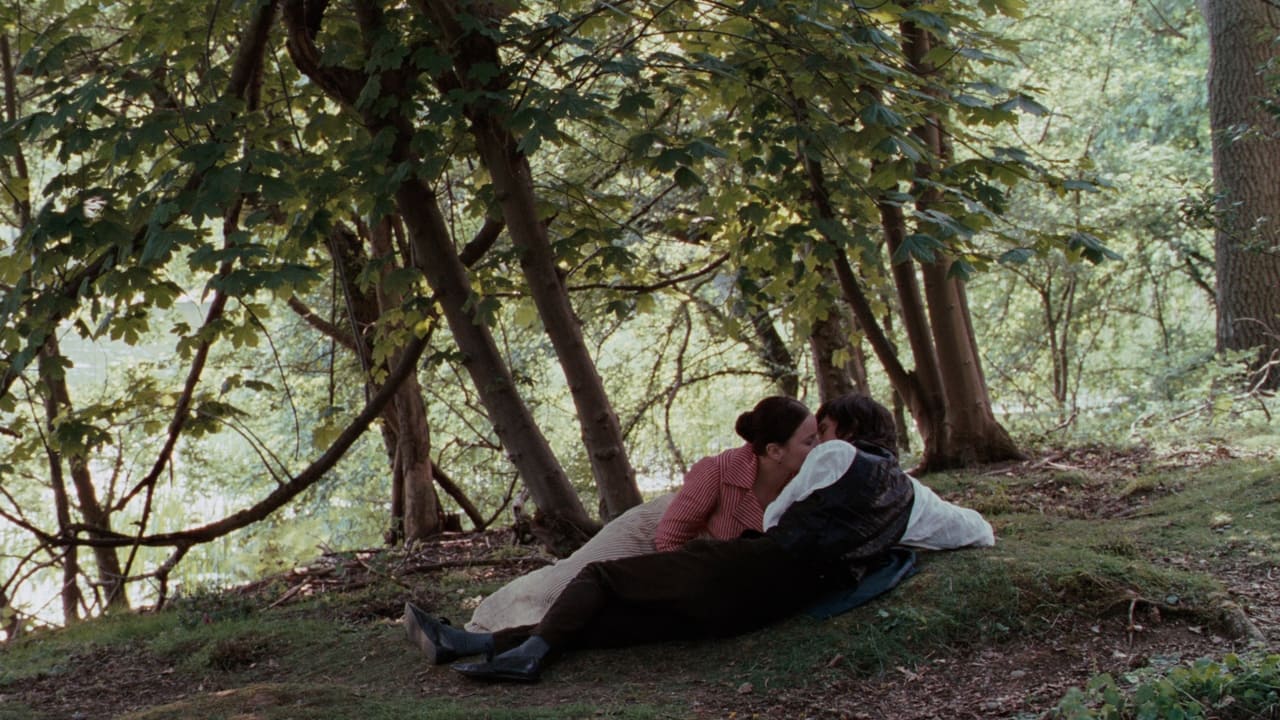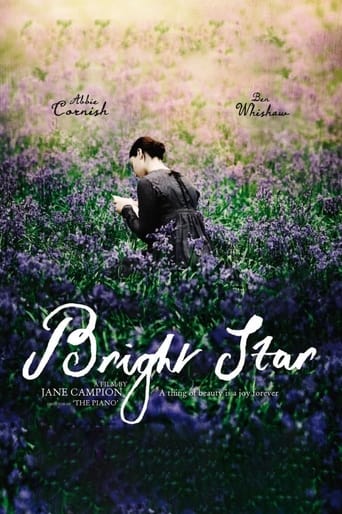

Perfectly adorable
... View MoreGood concept, poorly executed.
... View MoreIt's an amazing and heartbreaking story.
... View MoreThe film may be flawed, but its message is not.
... View MoreI was very impressed with "Bright Star," directed by Jane Campion. I've watched this movie at least three times. The acting is excellent, and the actors (Cornish, Whishaw, and all the supporting cast) realistically both the romantic passion of English ladies and gentlemen of this period and their restraint and adherence to social convention. When Fanny Brawne and John Keats express their love and devotion, they do so delicately and beautifully, with poetry (exquisite lines written by the great poet and delivered so hauntingly by Whishaw), surreptitious kisses, notes and subtle gestures. Not the garish grabbing and vulgar patter we see today. Campion's recreation of the English countryside and its slow-paced lifestyle is perfect. Cornish's Fanny is overwrought with emotion over her love for Keats, and even though it seems excessive to jaded moderns, I believe that was common for the time. Her feelings spill over. She doesn't know where to put them. She's also a feisty, determined, creative (she designs her own clothes and accessories) young woman with a zest for life and love. Keats is more introspective and quiet, but you feel how his love for her builds and deepens. "Bright Star" brings the Romantic period to life quite believably, and will encourage you to read Keats' poetry and more about the lives of these individuals.
... View MoreIt was a pleasure to see this movie. The action takes place in a long time ago, everything is somehow better than today. A special experience is that through the whole film, John Keats's lyrics are written. As someone who loves poetry, this movie is a real revelation.Poetry and a combination of love is a somewhat forgotten way to enjoy the company of the person you care about. Sometimes the boys used to make lyrics to the lyrics, today ... Some other time! The film is not a top achievement when it looks at the whole.The film is not a top achievement when it looks at the whole. However, the story is drinkable, beautiful filled with the most sensual feelings, so it is to look at this kind of real enjoyment. The costumes are phenomenal, I can say that the actors were at an enviable level. The end of the movie where the lyrics are recited for a few minutes is a hit.7,6/10
... View MoreIt's 1818 in Hampstead Village on outer London. Fanny Brawne (Abbie Cornish) is introduced to John Keats (Ben Whishaw). At first, he dismisses her as a fashionista. She pursues him by reading his poems. She shows compassion to his sick brother Tom who passes away. His lack of an income keeps him from truly pursuing a romance. His friend and writing mate Charles Brown (Paul Schneider) aims to show Fanny as a cruel flirt by sending her a Valentine.In the sure hands of Jane Campion, this has both a poetic and true feel of romance. She shows restraint which only heightens the passion. The Brown valentine is a shocking turn and the height of romantic drama. In particular, Abbie Cornish delivers a compelling of a relentless love from the heart and passion from the time era.
... View MoreJane Campion directs "Bright Star". The film is based on the last three years of the life of poet John Keats (Ben Whishaw), and charts his romantic relationship with a young woman, Fanny Brawne (Abbie Cornish).Like many of Campion's pictures ("Holy Smoke", "The Piano", "In The Cut"), "Bright Star" is both gorgeously directed and erotically charged. Campion's compositions are immaculate, her cinematography precious and the film's lighting oft recalls the faint whites of Johannes Vermeer.Typical of Campion, "Bright Star" also manages to be sexy despite the chastity of its lead characters. Where Campion's "Piano" and "Cut" charged music and words with sexual possibility, in "Bright Star" we're thrown into the world of two lovers who imbue words with an eroticism which their bodies aren't allowed. Separated by tight corsets, social barriers and tradition, Brawne and Keats ravish one another with prose and stanzas, poetry and literature becoming a form of prim foreplay.But Keats and Barwne aren't simply lovers stereotypically boxed in by the social mores of the 19th century. No, both are also a couple of strong-willed, assertive bohemians. Brawne is a fiery proto-feminist who walks at the beat of her own drum, and Keats likewise doesn't give a damn about what anybody thinks or says. This results in a film which breaks away from the conventions of most romantic films set in the 19th century. Rather than a Jane Austenesque tale in which social pressures keep lovers apart, Campion serves up a tale in which two lovers decide to remain apart as an act of both pragmatism and love; Keats refuses to marry Brawne so as not to be a financial burden and Brawne refuses to marry Keats as an act of deference, refusing to get in the way of his poetry. Keats and Brawne's romance may be doomed, but it is doomed because they mutually will it. It is doomed by choice.Campion is one of the few female directors to command a mainstream audience. Virtually all her films are underrated, "Bright Star" included. Arguably Campion's most confidently directed picture, it features an excellent performance by Abbie Cornish, whose difficult role requires a blending of fragility, inexperience, power and agency. Those looking for insights into Keats' life and poetry, however, will be disappointed. Unlike Brawne, Campion's Keats never amounts to anything more than a stereotype. He's a dainty "emo" artist, a giant caricature of a Romantic Poet, and the words which springs from his mouth and pen seems to come from a personality completely at odds with what Campion has sketched. The blunt, mannered prose of Keats is also at odds with Campion's visual beauty, which is gentle, ethereal and delicate. Still, these are minor criticisms. Campion's "Bright Star" is mostly excellent, at least insofar as it echoes the ethos of the Romantic Movement, a movement which arose in the mid 1790s and became unconsciously obsessed with a form of pantheism (seeing the divine in everything), nostalgia, naivety and reacted against Enlightenment principles (most of the famous Romantic artists eventually became giant reactionaries). Campion's Keats is similarly narrow minded, but to Brawne, these fixations make him irresistibly delectable.8/10 – Sumptuous. Worth multiple viewings.
... View More